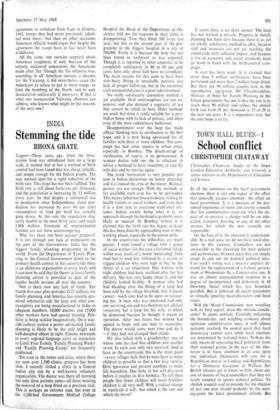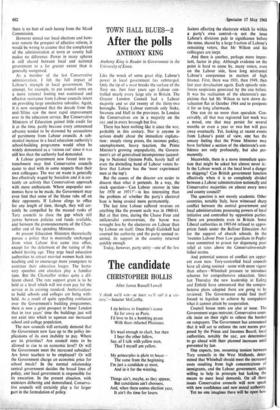School conflict
TOWN HALL BLUES-1 CHRISTOPHER CHATAWAY
Christopher Chataway, leader of the Inner London Education Authority, was formerly a junior minister at the Department of Education and Science.
In all the comment on the local government elections there is just one aspect of the affair that generally escapes attention : the effect on local government. It is a measure of the pre- sumed impotence of town and county councils that few commentators even ask what the im- pact of so massive a change will be on edu- cation, transport, housing, or any of the other services for which the new councils are responsible.
On the face of it, the omission is understand- able. In a real sense we do not have local elec- tions in this country. Councillors are not answerable to the electorate for their policies and performance. In most areas they are simply swept in and out on national political tides. Last week's voting was a massive popular de- mand for the replacement of a Labour govern- ment at Westminster by a Conservative one. It was an almost unprecedented response to a degree of incompetence and dishonesty in 10 Downing Street which has few historical parallels. But it followed all recent precedents in virtually ignoring local characters and local issues.
Will the Maud Commission, now wrestling with its final report, draw the obvious conclu- sions? It seems unlikely. Carefully redrawing the boundaries, and weighing evidence about optimum administrative sizes, it will almost certainly overlook the central point that local democracy cannot exist while local elections are determined by national issues. Perhaps the only means of separating local politicians from their national parties in the eyes of the elec- torate is to focus attention in an area upon one individual. Democrats will vote for a Republican mayor in Lindsay and Republicans for a Democrat Governor in Wallace, but British electors get to know so little about any one of dozens of local councillors that they are rarely tempted to ignore national politics. To abolish councils and to provide for the election of just one man should probably be the start- ing-point for local government reform. But there is no hint of such heresy from the Maud Commission.
However unreal our local elections and how- ever remote the prospect of effective reform, it would be wrong to assume that the complexion of the administration at town or county hall makes no difference. Power in many spheres is still shared between local and national government to a far greater extent than is generally recognised.
As a member of the last Conservative administration, I felt the full impact of Labour's strength in local government. The attempt, for example, to put council rents on a more rational footing met continued and effective resistance from Labour councils intent on providing large unselective subsidies. Again, it is now recognised that the decade from the mid-'fifties saw the most rapid improvement ever in the education service. But Conservative Ministers of Education gained little credit for it at the time, partly because every announced advance tended to be drowned by accusations of parsimony from Labour councils. A sub- stantial increase in a local education authority's school-building programme would often be widely denounced as a 'vicious cut' since it was still less than the authority had demanded.
A Labour government now forced into re- trenchment may find Conservative councils easier to deal with in some respects than their own colleagues. The war on waste is generally less effectively waged by Socialists and it is cer- tainly an activity that Conservatives approach with more enthusiasm. Where unpopular eco- nomies have to be made, the Government may even find that some of the blame rubs off on their opponents. If Labour clings to office for any length of time, though, they will cer- tainly be compelled by the massed ranks of Tory councils to close the gap which still yawns between policies and funds available, and between the pronouncements of the Chan- cellor and of the spending Ministers.
At present Education Ministers theoretically pursue a policy that is materially unchanged from when Labour first came into office, except for the deferment of the raising of the school leaving age. They urge local education authorities to attract married women back into teaching and to encourage more youngsters to continue their education _ longer. The horta- tory speeches and circulars play a familiar tune. But the Chancellor strikes quite a dif- ferent chord. The rate support grant is to be held at a level which will not even pay for the service at its existing standard. Authorisations to build schools and colleges are being with- held. As a result of quite appalling confusion over the Government's building programmes, there is now a grim prospect in Inner London that in two years' time the buildings just will not exist into which to squeeze our increased school and college population.
The new councils will certainly demand that the Government now face up to the policy im- plications of its own inability to pay. Where are its priorities? Are council rents to be allowed to rise to an economic level? Or will the Government meet the increased subsidies? Are fewer teachers to be employed? Or will the Government charge an economic price for school meals? In the normal relationship central government decides the broad lines of policy, and local government is responsible for its execution. In the present situation, with ministers dithering and demoralised, Conserva- tive councils will certainly play a far larger part in the formulation of policy.







































 Previous page
Previous page